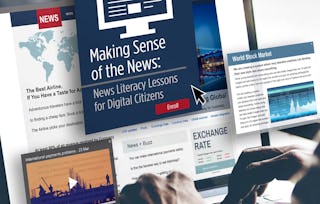Journalists develop information through interviews and sources. The most successful journalists quickly master these important skill sets. The production of journalism relies on several elements: newsgathering, interviewing sources, researching and trying to find as much information as possible. The course will also teach you how to where to find information, interviewing skills and how to process information from various sources for publication.

Gathering and Developing the News
Ends soon: Gain next-level skills with Coursera Plus for $199 (regularly $399). Save now.

Gathering and Developing the News
This course is part of Become a Journalist: Report the News! Specialization



Instructors: Joanne C. Gerstner
18,750 already enrolled
Included with
(509 reviews)
Skills you'll gain
Details to know

Add to your LinkedIn profile
See how employees at top companies are mastering in-demand skills

Build your subject-matter expertise
- Learn new concepts from industry experts
- Gain a foundational understanding of a subject or tool
- Develop job-relevant skills with hands-on projects
- Earn a shareable career certificate

There are 4 modules in this course
How - and where - journalists obtain information can determine if their news reports will be deemed credible and trustworthy by their audience. Finding the best sources for information and quotes is a process conducted by every professional journalist. You will learn the best ways to find information and sources for your reporting.
What's included
4 videos4 assignments1 peer review3 discussion prompts
Successful journalists understand the need to bring in different types of information and voices to create a strong and accurate news report. You will learn how journalists carefully consider sourcing, and how to effectively and ethically interact with sources.
What's included
4 videos5 assignments1 peer review3 discussion prompts
The interview is one of the most powerful tools of journalistic newsgathering. You will learn how journalists use interviews, the different forms it can take, how you can best prepare for it, and how to be sensitive to those who have been through trauma. A good interview can make a news report. And a bad interview can sink it.
What's included
4 videos1 reading5 assignments3 peer reviews
Technology and moving beyond typical sources is letting journalists reach more sources than ever before. You will learn how to use crowdsourcing, social media, press conferences and online resources as valuable tools to enhance your reporting.
What's included
4 videos5 assignments1 peer review
Earn a career certificate
Add this credential to your LinkedIn profile, resume, or CV. Share it on social media and in your performance review.
Instructors

Offered by
Explore more from Music and Art
 Status: Free Trial
Status: Free TrialMichigan State University
 Status: Free Trial
Status: Free TrialMichigan State University
 Status: Preview
Status: PreviewThe University of Hong Kong
 Status: Free Trial
Status: Free TrialMichigan State University
Why people choose Coursera for their career




Learner reviews
509 reviews
- 5 stars
79.56%
- 4 stars
14.34%
- 3 stars
3.73%
- 2 stars
0.98%
- 1 star
1.37%
Showing 3 of 509
Reviewed on Nov 26, 2016
I like the course and the teachers. I don't like the peer review because most of the students don't work hard enough on their reviews. I do want the challenge and the feedback.
Reviewed on Sep 7, 2019
this course helps me to stand again to pursue my dream job. I am very thankful to Michigan university.
Reviewed on Nov 24, 2017
This was the brilliant course. Being a journalist I found so many new things that I did not know earlier. For beginners and for experienced, this is simply gem of a course.

Open new doors with Coursera Plus
Unlimited access to 10,000+ world-class courses, hands-on projects, and job-ready certificate programs - all included in your subscription
Advance your career with an online degree
Earn a degree from world-class universities - 100% online
Join over 3,400 global companies that choose Coursera for Business
Upskill your employees to excel in the digital economy
Frequently asked questions
To access the course materials, assignments and to earn a Certificate, you will need to purchase the Certificate experience when you enroll in a course. You can try a Free Trial instead, or apply for Financial Aid. The course may offer 'Full Course, No Certificate' instead. This option lets you see all course materials, submit required assessments, and get a final grade. This also means that you will not be able to purchase a Certificate experience.
When you enroll in the course, you get access to all of the courses in the Specialization, and you earn a certificate when you complete the work. Your electronic Certificate will be added to your Accomplishments page - from there, you can print your Certificate or add it to your LinkedIn profile.
Yes. In select learning programs, you can apply for financial aid or a scholarship if you can’t afford the enrollment fee. If fin aid or scholarship is available for your learning program selection, you’ll find a link to apply on the description page.
More questions
Financial aid available,
¹ Some assignments in this course are AI-graded. For these assignments, your data will be used in accordance with Coursera's Privacy Notice.




